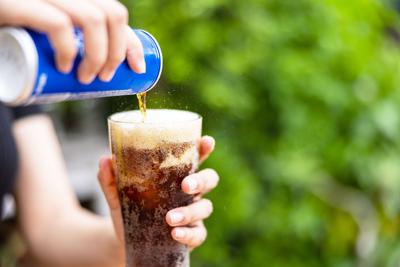Not all sugars are created equal, and the way you consume them may affect your health differently, according to a new study.
The research, led by Suzanne Janzi, a doctoral student in nutritional epidemiology at Lund University in Sweden, found that sugary drinks pose a greater risk for cardiovascular disease than baked treats like pastries. Published in the journal Frontiers in Public Health, the study examined nearly 70,000 Swedish men and women over 12 years.
Participants shared their diet and lifestyle habits between 1997 and 2009, while data on their cardiovascular health—such as strokes, heart attacks, and heart failure—was collected until 2019.

Sugary Drinks vs. Sweet Treats
Federal guidelines recommend keeping added sugars under 10% of daily calorie intake for anyone aged 2 or older. Researchers divided sugar consumption into three categories: sugary beverages, sweets like pastries, and toppings like honey or sugar in tea or coffee.
The findings revealed that sugary drinks, including sodas and fruit-flavored beverages, were linked to a higher risk of heart disease compared to baked goods. However, an unexpected twist was that participants with the lowest sugar intake did not necessarily have the lowest risk of heart disease.
Is No Sugar Really Better?
The study was observational, meaning it identified patterns but couldn’t confirm causation, Janzi noted. Researchers adjusted for factors like age, gender, smoking, alcohol consumption, exercise, and body mass index (BMI) but acknowledged the potential influence of unmeasured variables.
Interestingly, extremely low sugar intake might signal other issues. People who avoid sugar entirely may replace it with other unhealthy foods or nutrients, or they might have pre-existing health conditions or restrictive diets that lack essential nutrients, Janzi said.
In Sweden, the cultural tradition of “fika” — a coffee and pastry break — may also play a role. These social moments are deeply embedded in Swedish society and could contribute positively to cardiovascular health due to their link with social relationships.
Why Sugary Drinks Are More Harmful
Sugary beverages may be more damaging to heart health than solid treats due to how the body processes them.
“Liquid sugars are absorbed more quickly because they don’t require the same breakdown as solid foods,” Janzi explained. Solid sugars are often accompanied by nutrients like fiber, proteins, or fats, which slow digestion and lead to a more gradual release of sugar into the bloodstream.
In contrast, sugary drinks provide little satiety, making it easier to overconsume calories and disrupt appetite regulation.

How to Reduce Sugar Safely
Completely cutting out sugar isn’t necessary to improve heart health, Janzi emphasized. Instead, focusing on reducing sugary drink intake is a practical first step.
Dr. Robert Eckel, a professor emeritus of medicine at the University of Colorado and former president of the American Heart Association, agreed. “We all enjoy desserts. Should we skip birthday cake at a party? Of course not. But most Americans are consuming too much added sugar.”
The American Heart Association recommends no more than six teaspoons of added sugar daily for women and nine for men.
Small Changes, Big Results
Dietitian Lisa Drayer suggests gradually cutting back on sugary drinks. Start by reducing your intake by one serving per day until you’re down to one drink daily. Then aim for one every other day until soft drinks are phased out.
Replacing soda with seltzer or sparkling water can also help satisfy cravings for carbonation while reducing sugar intake.
By making mindful choices and understanding the impact of sugary foods and drinks, you can take steps toward better cardiovascular health—without giving up the occasional sweet treat.